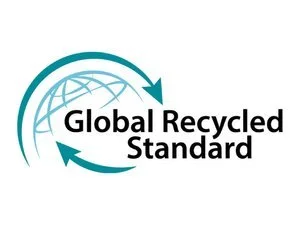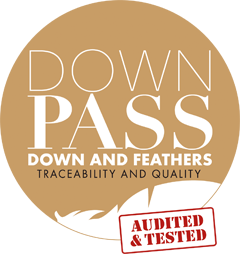certifications
OEKO-TEX
STANDARD 100 by OEKO-TEX® is one of the world's best-known labels for textiles tested for harmful substances. It stands for customer confidence and high product safety. Find out here what STANDARD 100 means and why it is worth checking for this label when buying textiles.
V-LABEL
The V-Label is an internationally recognised, registered symbol for labelling vegan and vegetarian products and services. For consumers, it is a simple and reliable guide to help them when they are shopping. With the V-Label, companies promote transparency and clarity.
GLOBAL RECYCLE STANDARD
The GRS is an international, voluntary, full product standard that sets requirements for third-party certification of recycled content, chain of custody, social and environmental practices and chemical restrictions.
ORGANIC CONTENT STANDARD OCS BLENDED
The Organic Content Standard (OCS) applies to any non-food product containing 5-100 percent organic material. It verifies the presence and amount of organic material in a final product. Further OCS tracks the flow of a raw material from its source to the final product. This process is then certified by an accredited third party.
ORGANIC CONTENT STANDARD OCS 100
The Organic Content Standard (OCS) applies to any non-food product containing 95-100 percent organic material. It verifies the presence and amount of organic material in a final product and tracks the flow of the raw material from its source to the final product.
GLOBAL ORGANIC TEXTILE STANDARD
The Global Organic Textile Standard (GOTS) is an internationally recognised organic textile standard. Since its introduction in 2006, GOTS has demonstrated its practical feasibility and is supported by the growth in consumption of organic fibres and the demand for a unified processing criteria from the industry and retail sectors.
FAIR WEAR
Fair Wear Foundation is an independent multi-stakeholder organisation that works with garment brands, garment workers and industry influencers to improve labour conditions in garment factories.
PETA-APPROVED VEGAN
More than 1,000 companies are using the “PETA-Approved Vegan” logo to highlight clothing, accessories, furniture, and home decor items made of vegan alternatives to animal-derived materials, such as leather, fur, silk, feathers, and bone. The logo helps consumers identify vegan items at a glance while shopping and make purchases that align with their values.
SEED
SEED was founded at the 2002 World Summit on Sustainable Development in Johannesburg by UN Environment, UNDP and IUCN as a global partnership for action on sustainable development and the green economy. SEED is based on the understanding that the promotion of social and environmental entrepreneurship is pivotal for environmentally friendly and socially inclusive development and poverty reduction.
control union certified
With its foundation in agriculture, Control Union Certifications has focused its efforts in developing services around the sustainability of the industry's supply chains which feed into the food, feed, forestry, biomass, bioenergy, social compliance and textiles markets. With 'boots on the ground' in more than 70 countries, Control Union Certifications is uniquely placed to manage challenges with today's global marketplace.
IDFL
IDFL is the global leader in auditing and testing for filled textiles. Founded in 1978 in Salt Lake City, IDFL is the largest filled-textile laboratory in the world. IDFL is committed to guaranteeing the quality of filled textile products and their raw material components. Also guaranteeS the integrity, transparency, and sustainability of the related supply chains.
DOWNPASS
The goal of the Downpass standard is to contribute to the ethical sourcing of down and feathers, and to help companies to firmly anchor and further develop the aspects of animal welfare during the sourcing of feathers and down in everyday business by reviewing suppliers in the industry supply chain.
SUSTAINABLE SOURCED FIBERS
MODAL
Introducing a more sustainable side to softness. This smooth and silky fabric is formed from natural beech wood using a process that’s self-sufficient in energy. Plus, it retains its strength wash after wash.
CUPRO
Cupro is a plant‐based material with incredible properties. It’s made from cotton linter, which are the soft fibres on the plant that are not used and usually go to waste. It’s 100% natural so the material is renewable and biodegradable, as well as soft, silky and breathable like cotton.
ORGANIC COTTON
Organic cotton is a familiar fabric for most of us. It’s grown from organic seeds, which have not been genetically modified in any way. The cultivation process requires no synthetic fertilisers and soil conservation is an important part.
RECYCLED COTTON
Recycled cotton is made by converting both pre and post-consumer fabric into fibres that are then spun into new yarn. Pre-consumer waste comes from material by-products while post-consumer includes repurposed linens, upholstery and more.
LINEN
Linen is a beautiful and durable material made from flax plants. Our organic linen derives from plants grown without chemical pesticides or fertilisers — better for farmers’ health and the environment. The fabric is of the same high quality as conventional linen but without any genetically modified fibres.
SEAQUAL
Seaqual is a high quality 100% post-consumer recycled polyester yarn containing Upcycled Marine Plastic. Mixing Sequal with cotton fibres we commit to our social and environmental ethos, drawing attention to the plastic pollution of the sea.
ALPACA
Alpaca fleece is the natural fiber harvested from an alpaca. There are two different types of alpaca fleece. The most common fleece type comes from a Huacaya. Huacaya fiber grows and looks similar to sheep wool in that the animal looks "fluffy".
MICROMODAL
Micromodal is a luxuriously soft and smooth fabric with some amazing technical properties. The fabric is made from natural Beech wood fibre and keeps you feeling cooler in the summer and warmer in the winter. This is because the fabric is a naturally dry environment and moves moisture away from the body. this dryness maintains the temperature control.
ECONYL
Nylon waste, otherwise polluting the Earth, is transformed into ECONYL regenerated nylon. It’s exactly the same as brand new nylon and can be recycled, recreated and remoulded again and again. That means you can create new products and buy new products without having to use new resources.
TENCEL
From their botanic origin, to the low environmental impact of production, to eventual biodegradability on disposal, TENCEL™ fibers exemplify sustainability in the textile industry. Benefits ranging from long-lasting softness to good color retention and contribution to breathability make TENCEL™ the fiber brand of choice for many leading garment and home furnishing producers.


























